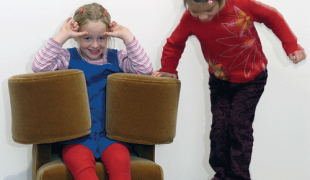- 7680
- 564
- 5
- 4
- 0
- Help Ukraine
About the solution
Danni Brennand, born in 1986, in UK, suffers from Autism, myalgic encephalomyelitis, probable postural orthostatic tachycardia syndrome, Irritable bowel syndrome, dyspraxia and anxiety. She has to spend a lot of time in bed due to her conditions, so she shared some tips about how to have a “perfect beding life”.
• Comfort is the top priority. Most clothes are not comfortable for lying in so don’t get worn. Some clothes are good though- t-shirts and leggings, shorts and skirts tend to work well for me. Pyjamas and night clothes are also good, and some of them can even pass as daywear.
• When I’m too ill for a proper bed bath, bath in bed wipes are often a pretty good substitute. These wipes are especially designed to be used for washing in bed.
• There are various ways of dealing with hair. Dry shampoo works for a few days, but I find it doesn’t do a great job when it’s gotten really greasy.
• For proper hair washing, an inflatable basin makes it a lot easier.
• Cushions and pillows are essential for comfort. The best I’ve found for me is a U shaped body cushion.
• An overbed table makes life much easier.
• If you’re living life completely in bed, then toileting will be done either by bedpan or incontinence pads.
• A sheepskin is wonderful for helping make a bed more comfortable and helping to prevent bedsores.
• If you’re well enough, a laptop, tablet or internet connected phone makes a massive difference.
• A Hydrant is great for drinks in bed without having to worry too much about spilling and you can go for a bit longer between refills as they go up to 1 litre in size.
• If possible, have as much stuff in reach as you can. The less you need to call for someone to get stuff, the better. When I was in a single bed I had a small bookcase next to my bed that held quite a lot.
• Bed socks are amazing. I find my feet get cold even while the rest of me is sweating and overheating, and proper bed socks are warm, comfortable and unlike normal socks, don’t dig in.
• My microwaveable penguins are awesome. Not only do they keep me company at all times, the heat also helps warm me up when my body temperature is all wonky and helps with pain.
• Try and have the bedroom as pleasant as you can.
• You can get remote controlled lights and electric switches.
• Don’t forget to move while you’re in bed!
• A waterproof mattress protector is essential. You will spill something at some point and the last thing you want to do is soak the mattress.
• Have a way to contact whoever helps you. For me, I can use my tablet to message Johan, or if necessary send him a text message or call his phone (it’s connected to my phone via Bluetooth).
• Try to remain positive. Living in bed is not the end of the world. It may not be what you choose but it doesn’t have to be completely negative.
Adapted from: http://dannilion.com/2013/07/perfecting-bed-life/
这些解决方案不应包括使用药物,化学品或生物制品(包括食品);创伤性设备;冒犯性的,商业或内在危险的内容。该解决方案未经医学验证。请谨慎进行!如果您有任何疑问,请咨询健康专家。
-
-
1018
-
0
-
21791

跟踪自闭症儿童的系统
CAREGIVING
COMMUNICATION: Communicating, whether by speaking, listening, or other means
Social interaction
Autism
Assistive Daily Life Device (to help ADL)
Body-Worn solutions (Clothing, accessories, shoes, sensors...)
App (Including when connected with wearable)
Anxiety
Difficulty concentrating or making decisions
Social withdrawal or isolation
Restlessness or feeling slowed down
Loss of interest or pleasure in activities (anhedonia)
Promoting self-management
Managing Neurological Disorders
Preventing (Vaccination, Protection, Falls, Research/Mapping)
Caregiving Support
Child and Adolescent Psychiatry
Medical Genetics
Neurology
Pediatrics
Psychiatry
Israel
-
-
-
697
-
0
-
20976

The squeeze chair project
-
-
-
827
-
0
-
17935

Proloquo2Go – App to help people communicate
CAREGIVING
COMMUNICATION: Communicating, whether by speaking, listening, or other means
Social interaction
Paralysis
Autism
Cerebral Palsy
Brain Stroke
Brain Injury (Abscess, Brain Barrier Defect, Brain Contusion, Brain Hemorrhage, Brain Edema)
Assistive Daily Life Device (to help ADL)
Assistive Technology access
App (Including when connected with wearable)
Tremors
Muscle cramps or spasms
Difficulty coordinating movements
Muscle weakness
Difficulty speaking or understanding speech
Trouble with fine motor skills (e.g., writing, buttoning clothes)
Twitching or involuntary movements (myoclonus)
Acquired language impairment (Aphasia)
Promoting self-management
Managing Neurological Disorders
Building Supportive Community Relationships
Promoting inclusivity and social integration
Improving Speech and Communication
Caregiving Support
Clinical Pathology
Medical Genetics
Neurology
Pediatrics
Rheumatology
Netherlands
-
 zh
zh